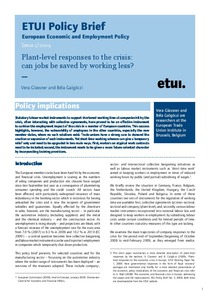Plant-level responses to the crisis: can jobs be saved by working less ?

Galgóczi, Béla ; Glassner, Vera
European Trade Union Institute for Research, Education and Health and Safety, Brussels
ETUI - Brussels
2009
7 p.
economic recession ; employment ; unemployment ; trade union ; government policy
EU countries ; Germany ; France ; Belgium ; Netherlands ; United Kingdom ; Hungary ; Czechia ; Slovakia ; Poland ; Bulgaria
ETUI Policy Brief. European Economic and Employment Policy
1/2009
Business economics
English
2031-8782
"Statutory labour market instruments to support shortened working time at companies hit by the crisis, often interacting with collective agreements, have proved to be an effective instrument to cushion the employment impact of the crisis in a number of European countries. This success highlights, however, the vulnerability of employees in the other countries, especially the new member states, where no such solutions exist. Trade unions have a strong case to demand the creation or expansion of such instruments. Yet short time working schemes can give a temporary relief only and need to be upgraded in two main ways. First, workers on atypical work contracts need to be included; second, the instrument needs to be given a more future-oriented character by incorporating training provisions."
Digital
The ETUI is co-funded by the European Union. Views and opinions expressed are however those of the author(s) only and do not necessarily reflect those of the European Union or the ETUI.